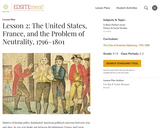
This lesson examines the ways in which France challenged American sovereignty between 1796 and 1801.
- Subject:
- History
- Material Type:
- Lesson Plan
- Provider:
- National Endowment for the Humanities
- Provider Set:
- EDSITEment!
- Date Added:
- 09/06/2019

Social studies resources for remote high school learners. Providers include the Alabama Learning Exchange, the City University of New York's HERB Social History Project, the Digital Public Library of America, the Michigan Open Book Project, and the National Endowment for the Humanities. You can refine the collections by selecting different fields, such as material types, on the left side of the page, under Filter Resources.

This lesson examines the ways in which France challenged American sovereignty between 1796 and 1801.
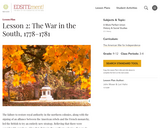
The failure to restore royal authority in the northern colonies, along with the signing of an alliance between the American rebels and the French monarchy, led the British to try an entirely new strategy in the southern colonies. This lesson will examine military operations during the second, or southern, phase of the American Revolution.
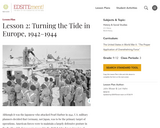
Although it was the Japanese who attacked Pearl Harbor in 1941, U.S. military planners decided that Germany, not Japan, was to be the primary target of operations. This lesson plan will focus on the overall strategies pursued by the Americans and their British allies in the initial months of World War II in Europe.
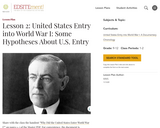
What is the most compelling evidence explaining why the U.S. entered World War I? After completing the lessons in this unit, students will be able to: Take a stand on a hypothesis for U.S. entry into World War I, supported by specific evidence.
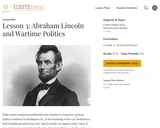
Whether it be called the Civil War, the War between the States, the War of the Rebellion, or the War for Southern Independence, the events of the years 1861-1865 were the most traumatic in the nation's history. This lesson plan will introduce students to wartime politics.
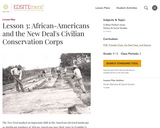
The Civilian Conservation Corps, a New Deal recovery and relief program provided more than a quarter of a million young black men with jobs during the Depression. By examining primary source documents students analyze the impact of this program on race relations in America and assess the role played by the New Deal in changing them.
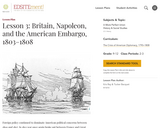
This lesson examines the ways in which Great Britain and France countries challenged American neutrality during the Thomas Jefferson administration.
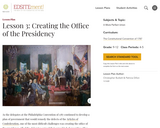
As the delegates at the Philadelphia Convention of 1787 continued to develop a plan of government that would remedy the defects of the Articles of Confederation, one of the most difficult challenges was creating the office of the presidency. This lesson will focus on the arguments over the various characteristics and powers of the office of president as debated during the Constitutional Convention of 1787.
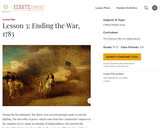
During the Revolutionary War there were several attempts made to end the fighting. In this lesson students will consider the various peace attempts made by both sides during the Revolutionary War.
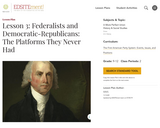
The rivalry between the Federalists and Republicans in the early days of the American Republic was bitter. What were the key positions of the parties? How important to the parties' positions were their basic attitudes toward constitutional interpretation (Federalists, broad interpretation / Democratic-Republicans, strict interpretation)? Which positions of either party resonate in the politics of today?
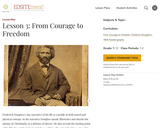
Frederick Douglass's 1845 narrative of his life is a profile in both moral and physical courage. In the narrative Douglass openly illustrates and attacks the misuse of Christianity as a defense of slavery. He also reveals the turning point of his life: his spirited physical defense of himself against the blows of a white "slave-breaker."
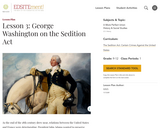
What arguments were offered in support of the Sedition Act? Washington's favorable attitude toward the Sedition Act illustrates that reasonable men in 1798 could support what most modern Americans would regard as an unjust law.
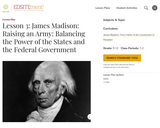
Not everyone in the U.S. supported the War of 1812. What events during Madison's presidency raised constitutional questions? What were the constitutional issues? Where did Madison stand?
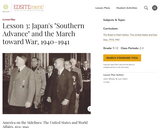
For the Japanese leadership, events in Europe during the first half of 1940 offered new opportunities for resolving the war in China. In this lesson students will examine primary documents and maps to discover why Japan embarked on its "southern advance."
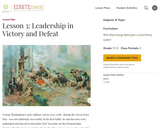
In this lesson, students examine Washington as a military leader and explore some of the difficulties he faced during the Revolutionary War.
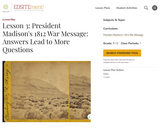
Students review the contents of the War Message and consider what documents might be useful in making further analyses of the text.
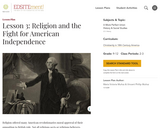
Using primary documents, this lesson explores how religion aided and hindered the American war effort; specifically, it explores how Anglican loyalists and Quaker pacifists responded to the outbreak of hostilities and how the American revolutionaries enlisted religion in support of the fight for independence.
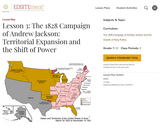
By 1828, the United States had changed greatly, though it was still a young country. Instead of 13 states, there were 24, and enough territory to make quite a few more. What was the source of Andrew Jackson's popularity?
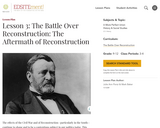
In this lesson, students examine the development of new constitutions in the reconstructed South. They also consider the political and social realities created by a dramatically changed electorate. In gaining a firmer grasp of the causes for the shifting alliances of this time, students see how far-reaching the consequences of the Civil War and Reconstruction era were and how much these events continue to shape our collective destiny today.
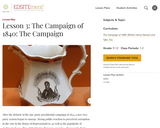
Many accounts portray the campaign of 1840 as almost exclusively about image, and manufactured images at that. This lesson gives students the opportunity to reflect on that point of view as they analyze campaign documents and accounts. Though intended for the teacher, all or part of the following background information may be useful for some students.